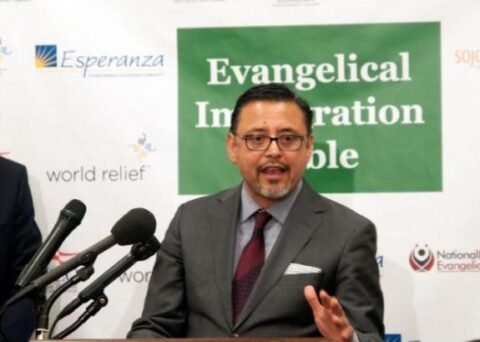Reform

A Look Backward and Forward at Immigration Platforms
Eight years ago, the similarities between the Republican and Democratic platforms on the issue of immigration reform were striking. The 2012 immigration planks for both parties are equally striking, but for the opposite reason. Where 2004 demonstrated a unified vision of a broken system requiring reform, 2012 represents a virtual breakdown in agreement at least in official party documents, on how to go forward on immigration. Comparing the evolution of the platforms from 2004 to 2008 to 2012 offers some insight into what has gone wrong in the immigration policy debate, and demonstrates why both sides need to come up with new, creative solutions to the continuing immigration policy crisis. Read More

California DREAMers Exhibit High Levels of Civic Participation, Yet Face Significant Hardships
By Caitlin Patler, Ph.D. Candidate in Sociology, UCLA There are roughly 5 million undocumented children and young adults currently living in the U.S. today, 24% (or 1.1 million) of whom live in California. As in other states, California’s undocumented youth face a unique and challenging paradox. On one hand, they work hard, excel academically, participate in their communities and have high educational and career aspirations in the only country they’ve ever known. On the other hand, their immigration status severely limits their opportunities, aspirations and ability to contribute fully to U.S. society. A new research brief, co-authored by Veronica Terriquez and this author, highlights the experiences of undocumented youth in California—many of whom disproportionally experience economic and personal hardships. Read More

Even Evangelicals Agree: Congress Needs to Take Action on Immigration
DREAM Act students, immigration advocates and community leaders have turned up the heat on Congress and the Obama administrative in recent weeks to do something, anything, about our nation’s immigration problems. Yesterday, Evangelical leaders—including the National Association of Evangelicals, and Focus on the Family—joined that effort, denouncing recent “self-deportation policies” and calling on leaders to break the gridlock on immigration. Read More

Young, Professional DREAMers Deserve Recognition
Earlier this week, numerous media outlets covered the story of Jose Godinez-Sampiero, a DREAM Act-eligible law school graduate whose application for a law license is currently pending before the Florida Supreme Court. Similar stories are playing out in California and New York, as young people brought to this country as children are now law school graduates, trying to make use of their professional degrees. The problem isn’t just for young lawyers, however, but is faced by many DREAMers, such as Dulce Matuz, an engineer turned DREAM Act advocate, who made Time Magazine’s Top 100 list this week. Read More

DREAM Advocates Begin a 3,000-mile March from California to Washington
Jose Gonzalez was born in Guadalajara, Mexico in 1987, but he has called California home for almost all of his 25 years. A community college graduate, as well as a youth minister in his church, Jose wants to attend a four-year university, but his family cannot afford tuition, and he cannot work to pay his own way. Like many others in his situation, Jose grew up as an American—speaking English, attending school, thinking about college and careers—only to learn one day that his presence here is not legal. Read More

Following State of the Union, President Obama Needs to Follow Through on Immigration Reforms
The President’s State of the Union address this week re-iterated some of his key themes on immigration—support for comprehensive reform, dismay that DREAM Act students and foreign students educated in this country have no way to legalize their status, and a belief that he’s done enough to the secure the border. More importantly, he framed these themes in context to America’s economic recovery, innovation and growth. However, while any mention of immigration in the State of the Union is welcome, it’s what the President didn’t say that may have more of an impact on how his administration is remembered this year on immigration—and how his vision is measured by voters in the coming election. Read More

New Report Finds that Immigration Creates U.S. Jobs
Immigration creates jobs for native-born Americans. That is the fundamental finding of a new study from the American Enterprise Institute and the Partnership For A New American Economy, entitled Immigration and American Jobs. The study—authored by Madeline Zavodny, a professor of economics at Agnes Scott College—reinforces the findings of numerous other studies which have demonstrated that there is no correlation between immigration and unemployment. Specifically, Zavodny analyzes Census data with the aim of answering one pivotal question: “In states with more immigrants, are US natives more or less likely to have a job?” Zavodny focuses on two groups in particular: immigrants with advanced degrees, and immigrants of any skill level who are in the country on temporary visas. Read More

Remembering the Benefits of IRCA, 25 Years Later
Twenty five years ago this week, President Ronald Reagan signed the Immigration Reform and Control Act (IRCA), an immigration reform bill which, despite a contentious debate, managed to pass a Republican Senate and a Democratic House. In fact, Reagan called the immigration bill one of the “most difficult legislative undertakings of recent memory” but one that “further generations of Americans” would “be thankful for.” And Reagan wasn’t wrong. Despite criticisms from both restrictionists and advocates that IRCA failed to address future waves of immigration, the benefits of IRCA—as well as the bipartisan support needed to pass it—should give our current congressional leaders something to think about. Read More

Dayton, Ohio Passes Plan to Revitalize Economy through Immigrant Integration
Shortly after Alabama began implementing their anti-immigration law (HB 56), Dayton, Ohio passed legislation that welcomes and integrates immigrants with the hope that they will revitalize their slowing economy. Faced with a declining population, Dayton’s City Commission voted unanimously last week to adopt the Welcome Dayton Plan—a plan that is tapping into the very economic stimulus that Alabama is driving out. Read More

Declining Cities Look to Immigrants to Revitalize Economies and Increase University Enrollment
In a recent speech to the U.S. Chamber of Commerce, New York City Mayor Michael Bloomberg highlighted the vital role immigrants play in stimulating economic growth. Bloomberg called for immigration policies that “spur innovation, increase the number of entrepreneurs who start businesses here, and create jobs for Americans on every rung of the economic ladder." With U.S. unemployment still hovering around 9%, some declining U.S. cities are also looking to harness the economic and entrepreneurial power of immigrants. Small towns, particularly in America’s rust belt, are contemplating programs that attract immigrant growth in hopes of revitalizing their towns and universities. Read More
Make a contribution
Make a direct impact on the lives of immigrants.
